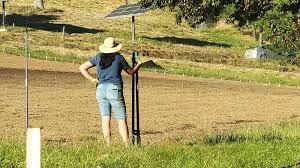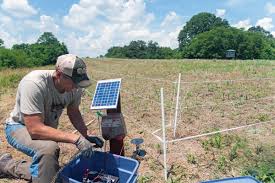As you can imagine, good project managers should have a variety of skills. Good program and portfolio managers often need additional skills and experience in managing projects and understanding organizational strategies.
This section describes some of the skills that help manage agricultural projects. Many more will be learned throughout the course of managing such projects.
Anyone serious about considering a career in project management should consider becoming a certified Project management professional. Being familiar with some of the project management software products available in the market today is essential.
Read Also: Are Honey Bees Aggressive?
Attributes of a Good Agricultural Project Manager

An effective agricultural project manager is one who should have the following skills/capacities:
1. Planning and Organizational Skills: These skills ensure proper planning and structure in agricultural projects, leading to better efficiency.
2. Personnel Management Skills: Effective management of teams involved in agricultural production and processing is critical for project success.
3. Communication Skills: Clear communication with stakeholders is important to ensure smooth agricultural operations.
4. Change Orientation: The ability to adapt and manage changes within the agricultural sector is essential for staying competitive.
5. Problem-Solving Ability: This skill is key to addressing and resolving issues that arise in agricultural operations.
6. High Energy Levels: Agricultural projects can be physically demanding, requiring high energy to keep up with the tasks.
7. Ambition for Achievement: Goal-oriented efforts drive success in agricultural projects by focusing on results.
8. Ability to Take Suggestions: Being open to feedback helps improve agricultural management processes and strategies.
9. Empathy with Team Members: Understanding the needs and viewpoints of those involved in agricultural activities strengthens team dynamics.
10. Ability to Quickly Develop Alternative Actions: This is essential for overcoming unexpected challenges in agriculture, such as weather or market changes.
11. Knowledge of Project Management Methods and Tools: These skills help organize, track, and ensure the success of agricultural projects.
12. Self-Evaluation Ability: Continuous self-assessment improves decision-making and the overall management of agricultural projects.
13. Effective Time Management: Timely operations are crucial, especially given the seasonal nature of agriculture.
14. Capacity to Relate Current Events to Agricultural Projects: Being aware of trends and events helps make informed decisions that impact farming outcomes.
15. Competence with Project Management Software Tools/Packages: Using these tools ensures smoother execution of agricultural projects through better tracking and coordination.
16. Flair for Sense of Humor: Maintaining humor can boost morale during stressful periods in agricultural projects.
17. Immediate Problem-Solving Skills: Tackling issues as they arise keeps agricultural projects on track.
18. Initiative and Risk-Taking Ability: Exploring innovative methods and managing risks helps drive agricultural growth and innovation.
19. Familiarity with the Organization: Understanding the structure and culture of the organization aligns agricultural goals with broader business objectives.
20. Tolerance for Differences of Opinion, Delays, and Ambiguity: Flexibility in handling uncertainties is key to navigating agricultural projects.
21. Knowledge of Technology: Being familiar with modern agricultural technology improves project efficiency and outcomes.
22. Conflict-Resolving Capacity: Addressing disputes quickly and fairly within teams or with external partners ensures smoother operations.
23. Team Building Skills: Creating a cohesive team fosters collaboration and enhances project success.
24. Resource Allocation Skills: Efficiently managing land, labor, and capital resources optimizes agricultural productivity.
25. Entrepreneurial Skills: These skills help identify and capitalize on opportunities in the agricultural sector, leading to growth and profitability..
Read Also: Honey Bees in Winter
Project Management Tools and Techniques in Agricultural Projects

1. Integration Management: This involves project selection methods, project management methodologies, stakeholder analyses, project charters, project management plans, project management software, change requests, change control boards, project review meetings, and lessons-learned reports.
2. Scope Management: It covers scope statements, work breakdown structures, mind maps, statements of work, requirements analyses, scope management plans, scope verification techniques, and scope change controls.
3. Time Management: Techniques include Gantt charts, project network diagrams, critical path analyses, crashing, fast tracking, and schedule performance measurements.
4. Cost Management: This entails net present value calculations, return on investment assessments, payback analyses, earned value management, project portfolio management, cost estimates, cost management plans, and cost baselines.
5. Quality Management: Tools used here are quality metrics, checklists, quality control charts, Pareto diagrams, fishbone diagrams, maturity models, and statistical methods.
6. Human Resource Management: This area uses motivation techniques, empathic listening, responsibility assignment matrices, project organizational charts, resource histograms, and team-building exercises.
7. Communications Management: It involves communications management plans, kickoff meetings, conflict management, selection of communications media, status and progress reports, virtual communications, templates, and project websites.
8. Risk Management: This includes risk management plans, risk registers, probability/impact matrices, and risk rankings.
9. Procurement Management: Methods here involve make-or-buy analyses, contracts, requests for proposals or quotes, source selections, and supplier evaluation matrices.
Project Success in Agricultural Projects
How do you define the success or failure of an agricultural project? There are several ways to define project success. The following outlines a few common criteria for measuring project success as applied to the example project of establishing a new 100-acre farm within six months for a budget of $500,000:
1. The project met scope, time, and cost goals: If the farm was established on 100 acres and met other scope requirements, was completed in six months, and cost $500,000, the project could be considered successful based on these criteria.
2. The project satisfied the customer/sponsor: Even if the project met initial scope, time, and cost goals, the stakeholders funding the agricultural project might not be satisfied if the project manager failed to communicate or if the quality of work was substandard.
3. The results of the project met its main objective: For instance, if the agricultural project resulted in profitable production or a good return on investment, it would be deemed a success regardless of other factors.
Project managers play a vital role in helping agricultural projects succeed. They work with the project sponsors, the agricultural team, and other people involved to meet project goals. They also work with the sponsor to define success for that particular project.
Good agricultural project managers do not assume their definition of success aligns with that of the sponsors. They take the time to understand the expectations of the sponsors. For example, if establishing a large-scale farm for someone, it’s important to find out what is most important to the sponsors:
i. Meeting the scope, time, and cost goals of the project.
ii. Satisfying communication and collaboration expectations during the project.
iii. Delivering the main objective, whether increasing yield, improving farm infrastructure, or ensuring long-term profitability.
The success criteria should help in developing key performance indicators (KPIs) to track the progress of the agricultural project.
Do you have any questions, suggestions, or contributions? If so, please feel free to use the comment box below to share your thoughts. We also encourage you to kindly share this information with others who might benefit from it. Since we can’t reach everyone at once, we truly appreciate your help in spreading the word. Thank you so much for your support and for sharing!
Read Also: What is Fitness? Types, Benefits You Should Know
Frequently Asked Questions
We will update this section soon.

